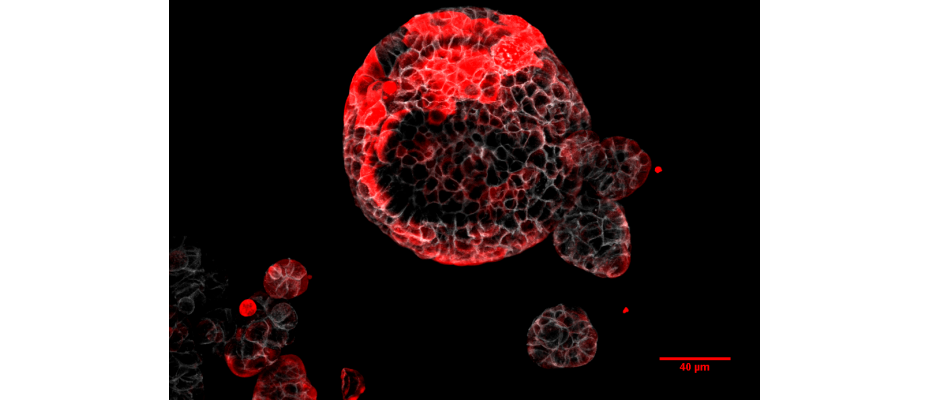
Barcelona, 9 November 2022 – Colon cancer is the third most common cancer in the world, with about 2 million new cases each year. Most patients are diagnosed when the tumour is still located in the colon or rectum. These tumours are removed by surgery and, in many cases, are treated with chemotherapy in an attempt to prevent relapse. However, for between 20% and 35% of patients, the cancer reappears in the form of metastases in other vital organs. These are caused by residual tumour cells that remain hidden at the time of surgery. Metastases are the leading cause of death from almost all types of cancer, including colon cancer.
Most colorectal cancer research has focused on the primary disease. In recent years, there have also been important advances in the characterisation of metastatic disease once it manifests. However, until now, it had not been possible to study this small population of disseminated tumour cells that is invisible to the diagnostic techniques used in the clinic. This lack of knowledge has resulted in a dearth of effective therapies to eliminate residual disease and prevent metastatic recurrence, which has a poor prognosis.
Now scientists led by Dr. Eduard Batlle from IRB Barcelona who is an ICREA researcher and group leader of CIBER de Cáncer (CIBERONC), have for the first time identified residual tumour cells hidden in the liver and lung and have described how they evolve to give rise to the appearance of metastases in these organs. The article is fully explained on the IRB website.
The Single Cell Genomics team at the CNAG-CRG has contributed to the study of this small population of cells responsible for colon cancer relapse.
“This work highlights the need for complementary single-cell sequencing pipelines to cope with different sample types and varying cell numbers. While micro-metastases provided an ultra-low input for plate-based Smart-seq2 sequencing, primary tumors and large metastases could be analyzed using higher throughput droplet-based methods. Together, it allowed to disentangle tumor cell heterogeneity and to identify the High Relapse cells responsible for metastasis formation and poor patient prognosis”, says Holger Heyn, team leader of the Single Cell Genomics team of the CNAG-CRG.
Image
Colorectal cancer organoid with residual cells responsible for relapse marked in red (IRB Barcelona)
Acknowledgements
We thank all of the members of the laboratory for their support and discussions; the staff at the IRB Barcelona core facilities for biostatistics, histopathology, functional genomics and advanced digital microscopy, as well as the flow cytometry, animal facilities of the UB/PCB, and the CRG genomic unit for assistance; the staff at the HCB-IDIBAPS Biobank for sample and data procurement. Sample collection of this work was also supported by the Xarxa de Bancs de Tumours de Catalunya (XBTC) sponsored by Pla Director d’Oncologia (PDO). A.C.-S., G.T. and L.J.-G. have held FPU fellowships from Spanish Ministry of Universities and A.A.-V. has held a La Caixa predoctoral fellowship. S.C. holds a FPI fellowship from the Spanish Ministry of Economy and Competitiveness (MINECO). H.H. is a Miguel Servet (CP14/00229) researcher funded by the Spanish Institute of Health Carlos III (ISCIII) and the Agencia Estatal de Investigación (AEI) and FEDER (SAF2017-89109-P). This work has been supported by ERC advanced grants 884623 (residualCRC to E.B.) and 883739 (Epifold to X.T.); LCF/PR/HR19/52160018 from La Caixa foundation; PID2020-119917RB-I00 from the Spanish MICINN; and CRUK Accelerator Award C7932/A26825 (ACRCelerate), in collaboration with AECC (grant GEACC19006BAT_2021). E.B., X.T. and H.H. are supported by the Fundació La Marató de TV3 (201903-30-31-32). H.H. received support for the project PID2020-115439GB-I00- funded by MCINN/AEI/10.13039/501100011033. S.L. was supported by a Wellcome Trust Senior Clinical Research Fellowship (206314/Z/17/Z)), E.J.M. is funded by the Lee Placito Medical Research Fund (University of Oxford). IRB Barcelona and IBEC are recipients of a Severo Ochoa Award of Excellence from MINECO. Single-cell profiling of CRC samples was supported by the Belgian Federation against Cancer grant nos 2018-127 and 2016-133 and by a grant from Fondation Roi-Baudouin. S.T. is supported by a Fundamental Clinical Researchers KU Leuven grant and Foundation against Cancer grant for this work. The Magdalena Socias Moyà fund supports metastasis research at IRB Barcelona.
Work of reference
Metastatic recurrence in colorectal cancer arises from residual EMP1+ cells











